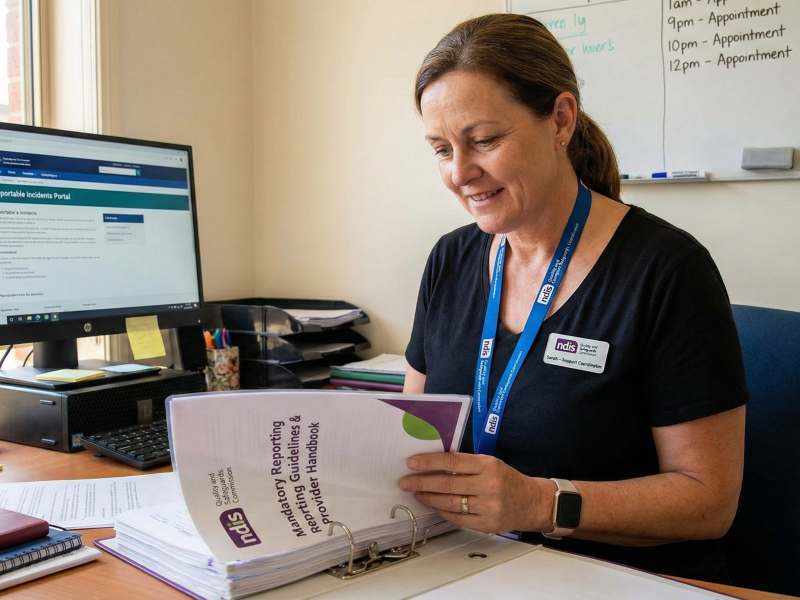Working as an independent National Disability Insurance Scheme (NDIS) support worker can be a rewarding and versatile career choice. It enables one to directly support and influence the lives of people with disability, while also having the freedom to work their own schedules and clients. With the growing need for disability support services in Australia, independent work can also provide financial and professional development opportunities for future ventures. This article covers the process of becoming an independent support worker for the NDIS, the services you can provide, getting the work, and the problems you can expect.
What Is An Independent Support Worker?
An independent support worker is someone who offers direct care and support services to NDIS Participants, and who is not employed by a Registered Provider or other workforce agency. They are instead small businesses, responsible for their own marketing, administration, insurance, and compliance with NDIS guidelines. Being independent means having the flexibility to choose clients, set your own pay rates, and offer services that align with your skills and interests. Independent support workers often form strong, consistent relationships with their clients, which is vital for effective, person-centred care.
Want to Attract More NDIS Clients?
Get expert advice on how to market your services, connect with clients, and grow your practice.
How to Become an Independent Support Worker
Getting started as an independent support worker is outlined below:
- To be an independent NDIS support worker, you should begin by deciding what kind of services you want to provide based on your qualification, experience, and interest.
- Speak to your accountant about setting up an ABN and a business bank account. You should also obtain insurances such as Public Liability and Professional Indemnity. Generally, it’s always a good idea to maintain a valid NDIS Worker Screening Check, Working With Children Check, Police Check, and First Aid Certification.
- Decide if you wish to be approved with the NDIS as a Registered Provider. Registration is not required for every Provider, but it might allow you access to more clients and broaden your offerings.
- Importantly, develop a comprehensive service agreement and advertise yourself on NDIS websites, social media, and local community networks.
- Finally, keep records, invoices, and follow NDIS Code of Conduct.
What Type of Services Can an Independent Support Worker Offer?
Independent support workers can offer extensive services according to their level of expertise and the client’s needs. Personal care (hygiene, grooming, bathing), domestic help (cooking, cleaning, shopping), community engagement (socialising, events) and general transportation are typical services provided by independent support workers. The services should be provided ethically and professionally, and according to the NDIS Participant’s Plan, needs and goals.
Generating an income as an Independent Support Worker
Income generation as an Unregistered independent support worker begins with setting competitive, transparent hourly rates. Rates should reflect your experience, qualifications, and the type of service offered. Stay updated with the NDIS Pricing Arrangements to ensure your rates align with industry standards. If you’re a Registered Provider, you will need to charge according to the NDIS Pricing Arrangements.
You can increase income by providing specialised skills (e.g., Auslan, mental health support), working on weekends, or even providing rural outreach services. Building long-term relationships with clients also guarantees steady income.
Timely invoicing and making use of user-friendly payment platforms can facilitate financial management. Finally, think about partnering with plan managers or support coordinators who can refer clients and handle billing, ensuring that you have a steady workflow.
How to Get Work as an Independent Support Worker
Getting work as an independent support worker requires active networking and exposure.
- Start by establishing a professional profile on NDIS-oriented websites such as Mable, Hireup, or Careseekers. These websites link workers to Participants who need support directly and often immediately.
- Utilize social media groups, neighborhood community boards, and disability forums to promote your services. Word-of-mouth and referrals from clients also contribute heavily to the reputation of independent providers.
- Community events or disability expos can assist in meeting prospective clients and industry experts.
- Alliance with plan managers and support coordinators is another strategic means of obtaining referrals because they tend to seek efficient, independent workers for their clients.
Referrals Start With Reputation – We’ll Help You Build Both
From networking tips to service refinement, we guide NDIS providers toward lasting impact.
Independent Support Worker Challenges
Independence is flexible, but flexibility also brings challenges. Having to manage every part of your business, from bookings to invoicing, takes time. Independence also lacks business continuity in situations of emergency, illness and other leave.
Finding clients in the first place might be tricky, and so marketing yourself properly is necessary. Insurance premiums, no paid annual leave, and emotional costs of solo work are also factors to consider.
Another challenge is maintaining compliance with changing NDIS standards, which necessitates ongoing professional development and awareness. A lot of support workers, however, find business independence and close-client relationships rewarding despite these hurdles.
FAQs
1. Do I require insurance as an Independent Support Worker?
Yes. Regardless of whether you are Registered or Unregistered with the NDIS, as an independent support worker, you are legally responsible for your actions when supporting NDIS Participants.
- Public Liability Insurance keeps you safe in case a client is injured while receiving your service
- Professional Indemnity Insurance defends you against claims of professional negligence.
Not only do these insurances keep you safe, but they also assure NDIS Participants and Plan Managers of your professionalism.
2. What are the advantages of being an Independent Support Worker?
There are a number of advantages such as flexible working hours, independence to choose clients, and higher earning possibilities. You can adapt services to the skills and areas of interest you possess, develop stronger relationships with clients, and not be bound by agency restrictions. Being independent also permits more professional and personal fulfillment and development on your own terms, as you are your own boss.
3. Is it possible to work as an Independent Support Worker with the NDIS?
Yes, you can work as an independent support worker for NDIS Participants, particularly those who self-manage or plan-manage their NDIS funding. Registration might be mandatory for high-risk services or government-funded services, and to access NDIA-managed Participants.
4. What kind of services can I provide as an Independent Support Worker?
You can offer a range of services like personal care, domestic tasks, transportation, community access, companionship, skill development, and support during outings or appointments. Services should align with your qualifications and the Participant’s NDIS goals. Always ensure your offerings are ethical, legal, and meet NDIS standards.
5. Do I need qualifications to be an Independent Support Worker?
Although formal qualifications are not necessarily required, obtaining a Certificate III or IV in Individual Support or Disability may increase your credibility. More significantly, you may also require foundational requirements such as an NDIS Worker Screening Check, Police Check, First Aid Certificate, and Working With Children Check. Manual handling, mental health, or autism support training can also improve your employability and service range.


